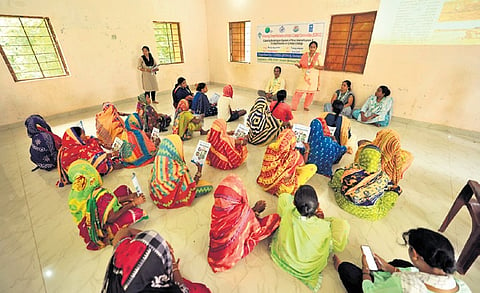

BHUBANESWAR: In the quiet village of Naranpur in Puri district, a silent revolution is taking roots with the efforts of Bilasini Mallik, a 48-year-old bamboo artisan turned climate warrior.
Away from the public eye, Bilasini is transforming lives by promoting sustainable farming, helping families in managing their waste, and bringing change to fields, one step at a time. She started working for the government as a ‘climate champion’ in 2023 and has so far helped 170 farmers in her area in adopting climate-resilient paddy cultivation, boosting yield while cutting the costs.
She has also guided 104 families in setting up kitchen gardens and improved waste management in over 80 households. Besides, the woman has introduced horticulture and livestock practices to enhance incomes of several other rural families.
Her work, forest officials said, has already touched over 422 people directly in the Bramhagiri area. “The opportunity to become a climate champion has provided me the scope to work in nearly 14 villages of Bramhagiri panchayat. People now see me not just as a bamboo artisan but as someone who brings change. It has also earned me respect in my village and the confidence of knowing that I can support my family and others,” she said.
Like Bilasini, 26-year-old Krishna Behera from Sunapur, a small fishing village in Ganjam coast, is another eco-champion who has been working for the cause of climate change. She is helping farmers in adopting scientific crab farming, enabling families, who were solely dependent on uncertain fishing trips to sea, to have an alternative source of income. Daughter of a fisher family, Behera is also leading plastic pollution cleanup drives and teaches school children about cyclone preparedness.
Like Bilasini and Krishna, about 300 women at the grassroots are working as ‘climate champions’, empowering communities for climate action through climate-resilient farming techniques and other sustainable practices in four districts - Ganjam, Balasore, Kendrapara and Puri.
Engaged and trained under the ‘Enhancing Climate Resilience of India’s Coastal Communities’ (ECRICC), an UNDP-supported government of India project focused on increasing the resilience of India’s coastal regions to the impacts of climate change, these women at the grassroots have now merged as the advocates of sustainable change in their localities.
“These climate leaders are now regenerating mangroves to protect their coastlines, cultivating saline-tolerant crops to secure food and income, and organising climate-smart drives to train others in sustainable practices. They are also leading awareness campaigns in schools, managing natural resources, restoring traditional knowledge systems, turning crisis into opportunity,” said principal chief conservator of Forests (PCCF), Wildlife and ECRICC state project director Prem Kumar Jha.
Jha said Bharati Sethi, from Chikiti block in Ganjam, one of the climate champions also represented the state’s ECRICC project in the Seafood Expo Bharat -2025, Chennai, recently where Odisha won the first prize for promoting climate-resilient aquaculture and inclusive community-based development. The state showcased the climate-resilient mud crab farming, one of the activities the women are taking up in the coastal districts.
“By promoting mud crab farming in controlled ponds, our climate champions are preventing farmers from going for the wild catch. This has been helping secure steady earnings for the local communities while allowing marine life to replenish and support a healthy mangrove ecosystem,” said ECRICC project manager Spandita Kar.
Forest officials said the climate advocates have helped more than 4,000 women-led SHGs in gaining skills, accessing markets, and championing eco-friendly livelihoods. The project has a target to reach 1,16,017 families, of which nearly 60 per cent are direct beneficiaries and women.